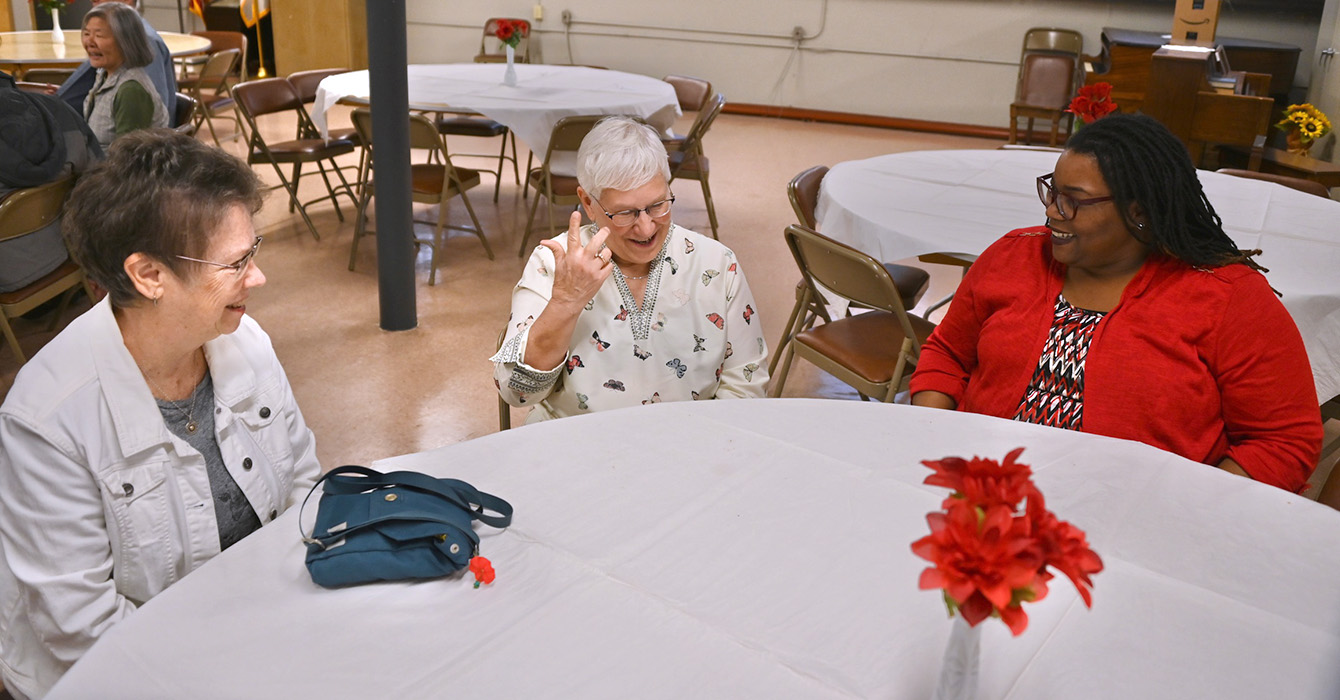Update: Dale P. Andrews died on June 23, 2017.
Balancing the pastoral and prophetic roles of the pastor and the church is vital if people are to be in healthy and nurturing mutual relationship with one another, said Dale P. Andrews.
“What is the relationship between pastoral care and prophetic care, and can we really adequately understand either one without the other?” he said.
This question combines many of Andrews’ interests. An ordained minister in the African Methodist Episcopal Zion Church, Andrews is a popular lecturer and preacher, as well as a social activist. In addition to his careers in ministry and academia, Andrews trained and worked in the field of mental health for many years.
He holds an M.A. and a Ph.D. from Vanderbilt University. He also earned an M.Div. from Princeton Theological Seminary and was a visiting research fellow at Oxford University.
Andrews currently is a distinguished professor of homiletics, social justice and practical theology in Vanderbilt University’s Divinity School and Graduate Department of Religion. Previously, he served on the faculty of Boston University School of Theology as the Martin Luther King Jr. Professor of Homiletics and Pastoral Theology and at Louisville Presbyterian Theological Seminary as the Frank H. Caldwell Associate Professor of Homiletics and Pastoral Theology.
He is the author of several books, including “Practical Theology for Black Churches: Bridging Black Theology and African American Folk Religion,” and is the co-editor of the journal Homiletic.
His current projects include the role of black preaching in the public square and the need for the black church. Andrews also is writing a textbook on teaching preaching that translates the black church folk tradition into the classroom setting.
He spoke with Faith & Leadership while at Duke as the lecturer and speaker for the Divinity School’s annual Gardner C. Taylor Lecture series. The video clip is an excerpt from the following edited transcript.
Q: Talk about the work you’re doing on the tension between preaching and the prophetic.
I think Western Christianity has made an unfortunate turn in how it has developed its sense of faith identity. It becomes a distorted sense of personal salvation.
Perhaps the goal in Christianity is not personal salvation, but that personal salvation actually functions as a beginning again, another effort at living into God’s desire or will for humanity -- to be in relationship with humanity, but also for humanity to be in healthy and nurturing mutual relationship with one another.
How that translates now into my current research is this notion of a pastoral-prophetic dialectic. What we’ve learned from the black church experience is how the care for the soul relates with the care for the community and what -- I’m borrowing a term from a colleague -- constitutes “prophetic care.”
What is the relationship between pastoral care and prophetic care, and can we really adequately understand either one without the other?
When I taught at Louisville Seminary, I got involved in some social justice work in the community, protesting the killing of seven black men by Louisville police in five years. For two years, we held weekly protests.
I was fascinated at the reticence of the black church community to become involved (never mind the white church community). I’m astonished that the church community is so reticent to get involved with social-critical engagement.
The leader of this organization in these protests was a well-respected civil rights leader, Louis Coleman. I learned an immense amount about social justice work from this man. He was also a local pastor. But not only was the church where I worshipped reticent to get involved; there were limitations on how involved his own church would be.
I found that fascinating -- what is happening, what continues to happen, in our churches. The notion of faith identity that gets nurtured in the sense of God’s care for us does not translate dramatically into care for our community or care for one another.
I could not shake the interest of trying to study it and understand it more critically.
Q: What about those leaders in the church who may say, “Well, social justice is a goal, but we are trying to keep our organization together, trying to keep it healthy, trying to keep it alive”? How do those two issues intersect?
Institution survival is a reality. It’s critically important. There was an age when the development of the black church itself -- the institutional development of the black church -- was a form of political resistance. When the development of the institutional black church was a form of spiritual nurture; that … personal salvation or the nurture of the soul was a form of justice-making. To re-dignify -- to re-humanize -- the personalities who were coming to the church was a form of protest as well as a form of nurture.
The development of the black church in society had that same dual capacity. It was a form of protest, but it was also a form of nurture of black communal life. So the goal of institutional maintenance or the goal of institutional survival is not necessarily a defiled goal. So I support that work.
That being said, I do think our churches struggle under extraordinary economic difficulty, particularly black churches or churches with a high constituency dealing with poverty or working poor. At some point, we have to learn how to go about nurturing our resources that does not also -- or developing our resources together -- that does not buy into some of the cultural aspects of prosperity that is uncritical.
Yet, at the same time, we have to take care of the maintenance of the building; the maintenance of the institution; the maintenance of the staff. The staff have to survive, as well. However, that is not the sum total of the work of the church. This is a problem…because that work is so difficult to sustain, it ends up being all the church is about, or most of what the church is about.
Now I’m not pastoring any longer, so I do confess that I say this -- what I’m about to say -- is from a place where my immediate church is not at risk. Although I’ve said it in churches where I’ve been an associate pastor: If we’re going to die, if we’re looking at facing death, then let us go out trying to be the church.
We still work at the institutional maintenance, but if we’re facing death, let us face death with faith that our death is not the end of our life. And let us go out dying by doing that justice-making out in the community, and we will be faithful in doing it and trusting in God’s faithfulness to work with us.
And if we die while we’re being faithful, our death is not the end of life.
It’s an amazing distortion in Western Christianity of how we understand God’s faithfulness and God’s blessing. We distort it into some contractual arrangement -- that we give so that we receive. We hear it in our preaching all the time: “You can’t beat God’s giving, no matter how hard you try.”
We don’t give so that we receive; we give in the assurance that that’s how involved God is in responding to our giving.
What happens when the work of the church is about only developing the church? I don’t think, in our theological self-awareness, that’s our claim. But when we’re functioning that way, it becomes an incredible distortion of what it means to face survival or what it means to face ministry.
We have to learn to give for the sake of the other and just for their sake, to do that work because of the value that they hold to God and the value that they need to hold to us if we understand the relationship of the divine with creation.
Our relationship with God and our relationship with humanity -- those spiritual values which for the black church extend all the way back to African spiritual values of being in harmony with the creation, being in harmony with the divine and being in harmony with one another -- and how that translates into Christian theology for us is critical.
We’re never done with that work, and that’s the beauty of our faith. It’s also the frustration.
We have a lot of company in trying to face how we continue to offer a tradition that we still believe holds incredible potential for ministry for the black community and, by extension, the black church in the larger community. We seek the healing and reconciliation of the black community, but we also seek the healing and relationship of the black community with the surrounding community -- the local community, the state community, the national community, the global community. We have a lot of work to do in how to do that.
Q: Talk about your project on the teaching of preaching.
It’s work on how to translate the systems of teaching and learning preaching from apprenticeship models that are the gift of the black church into a classroom setting.
Black preaching is not an ontological gift that’s relegated only to black preachers. It’s a gift that’s been nurtured out of certain contexts. [The challenge is] how to share those gifts as a form of teaching and learning in another setting.
So I’m working at trying to translate that into a textbook -- how to translate apprenticeship models of learning and teaching preaching into homiletics methodology. How can we create access to the gifts of teaching and learning preaching from black preaching traditions and other folk traditions of preaching into a classroom?
Q: How do you do that?
It’s extraordinarily difficult. Basically, what I have been doing for the last handful of years is testing out exercises in the classroom.
I spend a lot of time helping students identify what they understand about preaching through listening to sermons, watching sermon tapes, sharing sermons with one another, as a way to gain entry into understanding how homiletic methodology works for sermon preparation. We move from the preaching event backward into the sermon preparation activity, to help students see that the sermon preparation activity is part of the preaching event.
I build exercises around this. I try to help students understand that what we have experienced or have named in homiletic methodology as “encounter” is actually, for the preacher, not the encounter. The encounter is in sermon preparation. We are doing all our research and exegetical research, our theological-critical reflection, our cultural analysis, our scriptural applications, our searches for illustrations -- we’re doing all this trying to discern an encounter of God’s self-revelation.
So as we move toward the preaching event from that work, we’re actually starting to reconstruct the encounter, so that by the time we get to the preaching event, the community’s encounter is actually, for the preacher, a re-encounter.
But I call the teaching of preaching almost a pre-encounter, to take that back one step further and to help to teach students how to enter their sermon preparation process. Where I begin is with the gifts that they bear, and also with the difficulties they bear.
A line that I often use in class is, “One of my tasks is to help you identify your gifts. I call those gifts your ‘gravy.’ One of my tasks is also to help you identify your ‘gristle’ -- your shortcomings, your difficulties, your stumbling blocks.”
The work of mentoring and apprenticeship is to learn that we always bear difficulties but we can use our gravy to tenderize our gristle.
How, then, do we work at bringing our gifts into relationship with our shortcomings or our difficulties? That’s the apprenticeship tradition. You’re learning material. You’re learning a fund of knowledge, but you’re also learning how to work with that fund of knowledge. You are part of that material that you’re working with.
The difficulty is, I have to work at developing a homiletic methodology that students can use for sermon preparation, but at the same time, I have to work at developing a homiletic pedagogy that is consistent with the methodology of apprenticeship learning. That’s the difficulty of the work and why I’m very grateful that my students have forgiven me for using my preaching classes as a laboratory.
Q: How’s it going?
Some semesters, students are very merciful, and other semesters, the students are less so, but that’s a part of [how] they’re teaching me. They’re teaching me what’s working well in the translation, and they’re teaching me what’s not working well in the translation. But I have yet to be discouraged.







